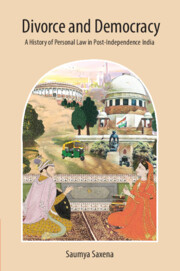Book contents
- Frontmatter
- Dedication
- Contents
- List of Figures
- Acknowledgements
- List of Abbreviations
- Introduction
- 1 Personal Law and the Making of Modern Religion, 1946–56
- 2 Committees, Codes, and Customs: Renegotiating Personal Law, 1957–69
- 3 Social Movements, National Emergency, and the Custody of the Constitution, 1967–79
- 4 Muslim Law, Hindu Nationalism, and Indian Secularisms, 1980–92
- 5 The Court in Context, 1992–2000s
- 6 From the Courtroom to the Courtyard: The Public Life of Personal Law, 2000–Present
- Conclusion
- Glossary
- Bibliography
- Index
2 - Committees, Codes, and Customs: Renegotiating Personal Law, 1957–69
Published online by Cambridge University Press: 20 May 2022
- Frontmatter
- Dedication
- Contents
- List of Figures
- Acknowledgements
- List of Abbreviations
- Introduction
- 1 Personal Law and the Making of Modern Religion, 1946–56
- 2 Committees, Codes, and Customs: Renegotiating Personal Law, 1957–69
- 3 Social Movements, National Emergency, and the Custody of the Constitution, 1967–79
- 4 Muslim Law, Hindu Nationalism, and Indian Secularisms, 1980–92
- 5 The Court in Context, 1992–2000s
- 6 From the Courtroom to the Courtyard: The Public Life of Personal Law, 2000–Present
- Conclusion
- Glossary
- Bibliography
- Index
Summary
Marriage is the basis of the family and family is the basic unit of a society. We should not by legislation do anything which may shake the foundations of our society to their very root. The path to promiscuity should not be opened out.
—Central government to Madras government, 1967Throughout its history, the pushback against the state's imagination of marriage (often shared with ways of the elite) has come from multiple stakeholders—individuals, activists, the women's movement, anti-caste movements, or even provincial/state governments. Yet the theorization of personal law regimes has tended to focus on particular legislations and cases such as the Hindu Code Bill debates in the 1950s or the Shah Bano case and the subsequent Muslim Women (Protection of Rights on Divorce) Act of 1986 as watershed moments. The excessive focus on legislative changes or landmark judgments in personal law produces an incomplete narrative of debates on family law, as it ignores the various unsuccessful attempts towards creating new legislation, which nonetheless contributed significantly to the political and social discourse. This chapter explores the role of various state-led initiatives in recognizing, validating, reforming, or modifying customary law and ritual practices in Hindu, Muslim, and Christian family law in the 1960s, in the aftermath of the Hindu Family Law Acts.
The various commissions, committees, and bills which attempted to amend Muslim and Christian family laws highlight the consistency of the state's concern and interest in codification. Law Commission reports on Christian marriage law and Muslim personal law illustrate also that these seemingly ‘unsuccessful’ attempts to spark legislative change were in fact transformative. The chapter probes the question, when and how is law reform deemed a success or a failure? The latter half of the chapter analyses how the state also confronted the diversity within Hinduism, as regional customs and practices were incorporated through amendments in different provinces. These parallel narratives of Christian, Muslim, and Hindu personal laws reveal the looming shadow of the Hindu Code Bill on family law debates.
As early as 1960–62, the Law Commission considered amendments to Christian marriage laws, and to the Indian Divorce Act of 1869. Despite multiple attempts by the national government, the bill for amending Christian marriage laws lapsed by the third Lok Sabha (1962–67).
- Type
- Chapter
- Information
- Divorce and DemocracyA History of Personal Law in Post-Independence India, pp. 93 - 138Publisher: Cambridge University PressPrint publication year: 2022



